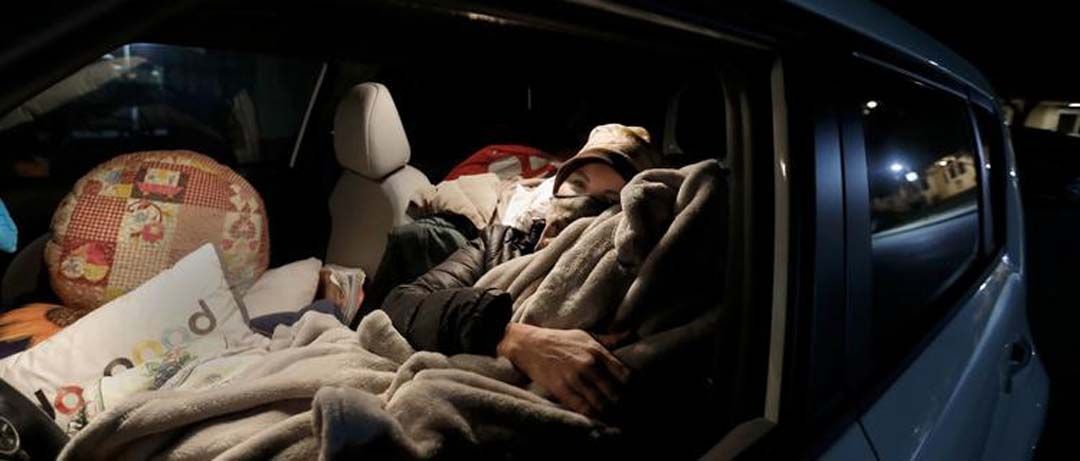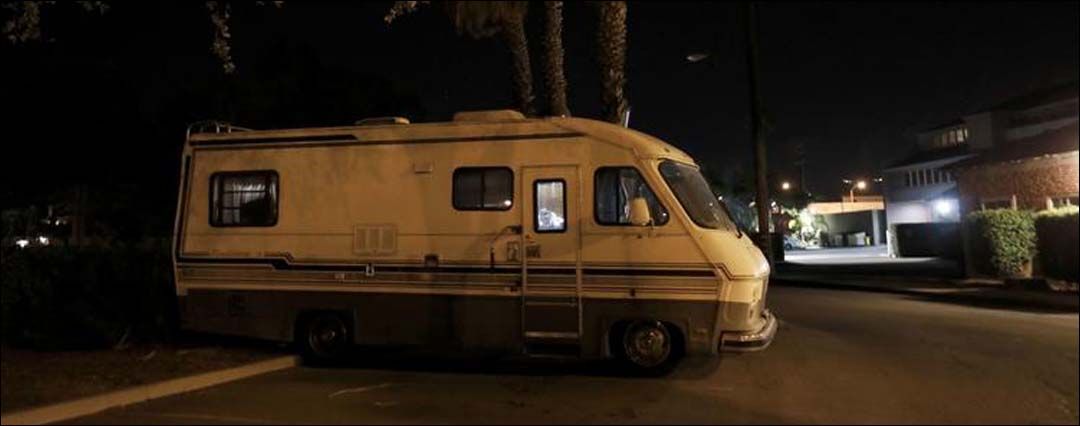Somewhere Safe To Sleep

To think of the Homeless, is to think of poor people sleeping in abandoned cardboard boxes in an alley behind some downtown building. Or living among tents in some small patch of trees, among other people at the end of railroad tracks. We think of those unfortunates as drug addicts, runaways and sometimes the mentally ill BUT more and more the face of homelessness drives a car and works a job.
"Living in a parking lot amid Santa Barbara's wealth is a kind of middle-class homelessness"
"Kathy is a senior citizen, Marva is a nurse, Santiago is a chef and Luis is an eighth-grade student. All of them live in Santa Barbara with one thing in common. When night falls, they head to designated parking lots and sleep in their vehicles, all clients in the region’s Safe Parking program.
“I was always into December and making the house wonderfully warm and beautiful,” said Kathy, whose holiday celebration is somewhat more austere these days. “I’ve got some little lights on the ceiling of the RV, and I got out my mom’s old snow globe, with a music box on it.”
Kathy is 65 and her longtime companion and RV-mate Phil is 74. Like so many others, they live on the edge in California, where high housing prices have pushed thousands of people to un-imagined extremes.
Living in a vehicle is obviously better than living in a tent or a box — it’s a kind of middle-class homelessness. But in affluent Santa Barbara and elsewhere, the ever-present convoys are another sign of growing income inequality and one of the state’s most vexing problems — even working people can barely afford to live in many parts of California.
---
When I moved to Los Angeles in the 90s, to start working in the movie business I lived in the back of my car too. I had friends out there and quite a bit of money saved up, but even taking almost a year to get ready, I couldn't line up housing from Missouri. The beat up old Ford van I had bought was serviceable but didn't look all that great. Before I moved I had spent some time and built a work bench in the back which could double as a bed.
Most nights for the first month or two, after spending a day looking for work, I would head for a parking lot or backstreet to get some sleep for a few hours. Almost always the place I would park out had notice that you could only park for a few hours, and I didn't want to deal with the police.
Once a week I would check in to this small motel. It was one step up from the proverbial "flop house". None of the rooms had bathrooms or showers, instead there was a two small public ones at the end of the hall, you could lock and use by yourself. The hotel had a gated parking lot, so you could be repetitively sure your vehicle wouldn't be broken into.
Eventually I found an apartment on the beach. Two men looking for a third roommate to share the rent. By then I had found a job too and I still had several thousand left in the bank. I had arrived at a good time and there was alot of work for someone willing to empty trash cans and sweep the floors of a movie set. I had the ability to get off the streets.
I moved back to St Louis in 2004, when the movie business had taken a downturn and my father's Alzheimer's had gotten worse.
---
"Phil said people may wonder why vehicle dwellers like himself don’t move in with family. Well, good for those who are able, but easier said than done, said Phil. His son is already sharing space because of the high cost of housing. Phil and Kathy described a middle-class life that fell apart for a variety of reasons, including an adjustable rate mortgage Kathy regrets buying into. Her paralegal career sputtered and she had several back surgeries while Phil lost his photo lab business, and their ages didn’t help. In 2013, they lost their condo and Phil invested in an old but serviceable RV, so they and their standard poodle would still have a roof, if not an address.
“My American dream was gone, and it broke my heart,” said Kathy, who’s living on a disability check, but that and Phil’s Social Security income aren’t enough to crack the housing market."

In the two decades since I was in Los Angeles, income inequality and the rise in rents was only grown larger and larger. Especially in booming places like California. Its a false El Dorado though. Those lucky enough to have good paying jobs are doing better and better, and those who Luck does not shine on, those with one or two bad breaks, are left to wander the urban desert. They just need a hand getting back on their feet.
"7 Myths About Homeless People Debunked"
The "Safe Parking" programs offers that kind of help.
Usually run by a non-profit or a church charity, these programs partner with area businesses and other churches, to provide places that homeless people in cars can park for the night. The parking lots are monitored by volunteers, and the "clients" go through a screening process for criminal records. There is zero tolerance for disruptive behavior.. The lots also have basic essentials like portable toilets, and in some cases access to a kitchen or shower.
While many local governments and businesses would prefer to simply have the police push the problem into another city, with threats of fines or jail time, such programs offer several benefits. For one, such homeless are less likely to pick a spot on a residential street, to the worry of the people living there. And for businesses, the sight of a person sleeping in their car, on their parking lot, whcih means the business owner must call the police, will decrease.
"People Living in Vehicles Need a Safe Place to Park, Not Fines or Jail"
Many cities have laws on their books, criminalizing the mere act of sleeping in your car. They usually carry hefty fines and jail time. Consider this, that a person arrested in your town, who can't pay their fine, means YOU pay for that fine, though your taxes.
What Can A Green Wizard Do?"
Check out "Dreams for Change"
They are a San Diego based nonprofit which runs one such program. You can read how they operate and how their program works.
Then check your local town for a similar program. You may be able to volunteer or give donations.
If there is no such program, consider talking to your church leaders about starting one. Church parking lots, unlike business parking is ideal for such a program, considering that they stand mostly empty through the week. Churches also usually have small kitchens and members who are retired and can volunteer a few hours to open those kitchens. Church members who can not volunteer time may be willing to donate money. You will need to rent several portable toilets and have them serviced. You may also want to hire a private security guard.
Don't forget your local government either.
First you may have to get a permit, or at least coordinate with your local police department to make such a program work. At first expect push back. Unfortunately, the mindset of Police has changed over the last few decades. Solving the "problem" has given way to "making the problem just go away".
Remember, they work for YOU.
A good relationship with your city council person is a valuable thing to develop. Not just for things like this, but also to effect changes that will need to be done, as the Collapse continues. Things like getting ordinances passed allowing people to raise chickens and other small meat animals in their back yards. Removing the blinders of Progress will take some doing as we downsize and learn to do with less.
None of us knows when an unexpected problem may come up, and shatter our best laid plans, as it has done to those in the articles. While WE have the resources to help, we need to use them. We never know when we might need that help ourselves.
(photo of "Marva Ericson sleeping in her car" and "RV on street" ©2017 by Francine Orr / Los Angeles Times)